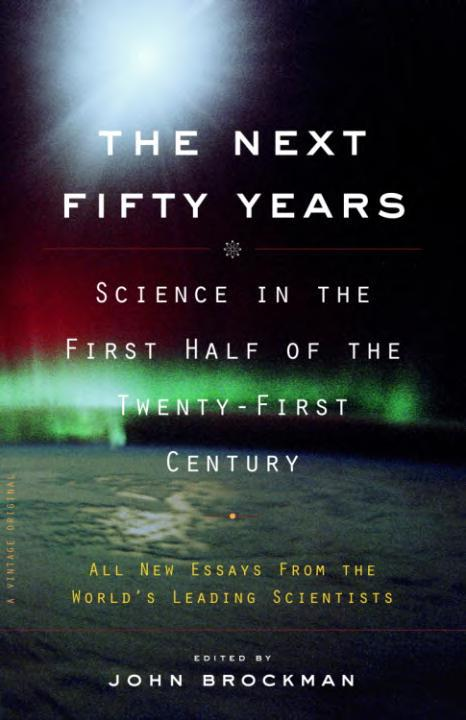
The Next Fifty Years
Science in the First Half of the Twenty-first Century
کتاب های مرتبط
- اطلاعات
- نقد و بررسی
- دیدگاه کاربران
نقد و بررسی

March 11, 2002
Agent Brockman has collected 25 of his writers to discuss the future of science in their respective fields of study. Several of these writers surpass ordinary trend spotting to entertain some rather pulse-quickening ideas completely beyond the kin of the so-called dominant paradigm. And some are of a magnitude to radically advance the nature of humans' interaction with each other, the planet and beyond. The neurologist Robert Sapolsky, for example, posits that sadness will take its place alongside AIDS and Alzheimer's as the most notorious medical disasters of the next half-century. Brockman, who is also an author-editor (The Third Culture; The Greatest Inventions of the Past 2,000 Years, etc.), divides his collection into two parts: the future in theory and the future in practice. Theoretical topics include cosmology, what it means to be alive, the nature of consciousness and the possibility of extraterrestrial intelligence. Mars exploration, DNA sequencing, neuroscience, child rearing and the like are addressed in the practical half. These essays can be quite technical, intended as they are to make the latest scientific information available for cross-disciplinary research. The intellectual adventures collected here point to a future that is dazzlingly bright, at least to the eyes of these unorthodox thinkers. The general public, for whom these essays are also written, should be similarly bedazzled.

April 15, 2002
How will the world change over the next 50 years as a result of scientific research and discovery? Providing a forum in which more profound meanings for the future of humankind and science are theorized, Brockman, a noted literary agent specializing in science writers, compiled this collection of essays by leading scientists from various disciplines. One piece by Marc D. Hauser, a cognitive neuroscientist and author of Wild Minds: What Animals Really Think, demonstrates science's present and future ability to alter brain tissue across species and manipulate genetic material, but asks, Should we? Robert M. Sapolsky (biological sciences and neurology, Stanford Univ.) illustrates how societal forces, such as divorce rates, transient lifestyles, and a technology that raises expectations, will continue to contribute to one of our most serious epidemics, depression. Brockman's intriguing view that popularized scientific writing, benefiting both scientists and lay people, has created a new "public culture" is well demonstrated in this work. Recommended for academic and large public libraries. Loree Davis, Broward Cty. Lib., Fort Lauderdale, FL
Copyright 2002 Library Journal, LLC Used with permission.

March 15, 2002
Across the variety of these 25 essays commissioned by science superagent Brockman, one subject predominates: life. Whether a psychologist, cosmologist, molecular biologist, or chemist, the authors collectively sense that the coming decades will see fundamental discoveries. By 2050, we might know how life originated, if it exists or existed on Mars, if Earth-like planets exist in other solar systems, and if the universe is "biophilic." On this Earth, genome-fiddling will mature because the moral debates will be resolved. However, according to several psychologists in this volume, the existential problem of attaining happiness will persist amid genetic manipulation. At the same time, scientists will build quantum computers, and, according to one author's speculation, microbes will produce computers in a metabolic process. So consign the desktop to the boneyard and the Internet, too, for according to computer scientist David Gelernter's prediction, the "cybersphere" will replace them. These science-authors, many premiere in their field, are clear, provocative, and sure to interest science readers.(Reprinted with permission of Booklist, copyright 2002, American Library Association.)

























دیدگاه کاربران